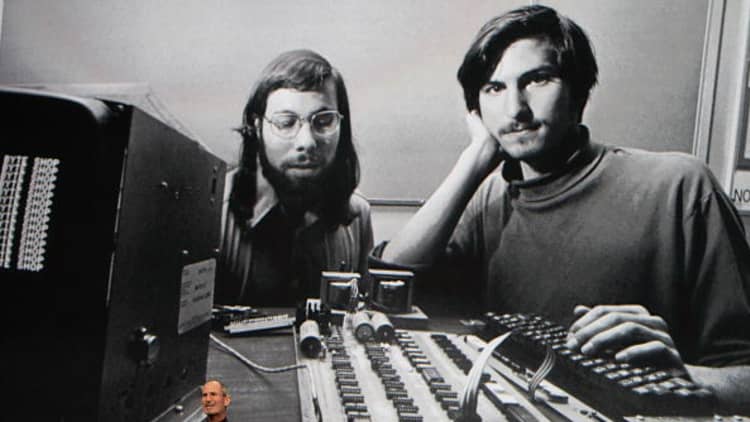
This time really is different.
Apple shares reached the historic $1 trillion market value Thursday, hitting the $207.05 price that was needed to get to the milestone. The tech giant is the first publicly traded U.S. company to reach a $1 trillion market capitalization.
Some investors may worry the most valuable company reaching these new heights could portend a significant drop is ahead like during dot-com technology bubble.
It's possible it could cool off in the short term, but for long-term investors the stock's valuation is far from extreme and based on improving fundamentals.
The company's stock rose 2.9 percent Thursday, bringing its year-to-date return to 22 percent versus the S&P 500's 6 percent gain.
Apple is valued at just 15.7 times analysts' earnings estimates for its next 12 months, compared with a forward price-earnings ratio of 16.5 times for the S&P 500. The valuation disparity comes as the smartphone maker increased its sales by 17 percent year over year and its earnings by 40 percent year over year in its June quarter, versus the estimated 8 percent sale growth rate for the average S&P 500 company this year.
In comparison, during the dot-com bubble the top technology stocks were valued at much higher earnings multiples. Microsoft traded at 59 times earnings, Cisco at 179 times earnings, Intel at 126 times earnings and Oracle at 87 times earnings in 2000.
Wall Street's "dean of valuation," Aswath Damodaran, told CNBC on Wednesday that Apple is still "reasonably valued" and "not trading at that high a multiple of earnings" at these levels.
In addition to Apple's attractive valuation versus the market, investors also get the benefit of the company's increasing shareholder capital returns.
Apple returned about $25 billion per quarter to shareholders through stock buybacks and dividends this year versus the approximately $11 billion per quarter last year. Buybacks lower the company's shares outstanding, resulting in higher earnings per share.
The tech giant hinted even more is coming, which is helping its share price. Apple had a $129 billion net cash position or cash minus debt at the end of the June quarter. On Tuesday its management reiterated its previous guidance to bring down its large net cash position to near zero, signalling to investors that more buybacks and dividends are likely.
One well-known investor has endorsed Apple's stock buyback program as a big reason to own the company's shares.
In May, Warren Buffett explained to CNBC the dramatic benefit of Apple's capital return programs for shareholders.
"When I buy Apple, I know that Apple is going to repurchase a lot of shares," he said. "We own about 5 percent. But I know I don't have to do a thing and probably in a couple of years we'll own 6 percent without laying out another dollar. Well, I love the idea of having 5 percent go to 6 percent."
Buffett's Berkshire Hathaway is currently Apple's second-largest shareholder and added nearly 75 million shares to its stake in the smartphone maker during the first quarter.


